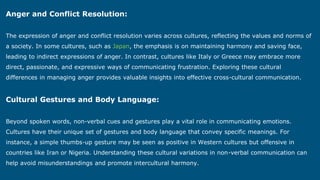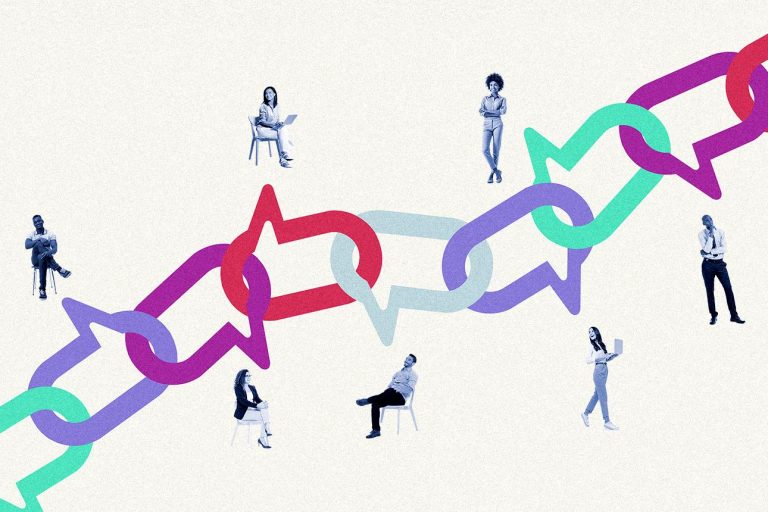Exploring the Intersection of Language and Culture

Welcome to the linguistic rollercoaster of cultural confusion! In this article, we’ll be delving into the perplexing, perplexing world where language and culture collide like a disastrous blind date. From linguistic faux pas to cultural taboos, get ready for a wild ride through the intersection of language and culture. Grab your dictionaries and passports, because things are about to get lost in translation faster than you can say “awkward!
The Influence of Language on Cultural Identity
Have you ever thought about how the language you speak shapes your cultural identity? It’s like a linguistic superhero cape, defining who you are and where you come from. Let’s dive into the fascinating world of language and its influence on cultural identity.
**Words are more than just words**
In every language, there are untranslatable words that capture the essence of a culture. Take the German word “schnapsidee,” which means a crazy idea that only sounded good when you were drunk. Or the Japanese term “tsundoku,” which describes the act of buying books and letting them pile up unread. These words reflect the unique quirks and values of their respective cultures, showing how language can paint a vivid picture of who we are.
**Accentuate your heritage**
Whether you roll your Rs like a pro or struggle with silent letters, your accent tells a story about your cultural background. From the musical tones of Mandarin Chinese to the melodic lilt of Italian, accents add flavor to our words and connect us to our roots. Embrace your accent as a badge of honor, a linguistic fingerprint that sets you apart in a world full of voices.
**Lost in translation**
Ever tried to translate a joke from one language to another, only to have it fall flat? The nuances of language can be a tricky beast, with cultural context playing a crucial role in how we communicate. What’s funny in one culture might be offensive in another, showing how language shapes our perceptions and interactions with the world. So next time you’re laughing at a joke, remember that it’s not just the words that matter – it’s the cultural context behind them.

Uniqueness of Language and Cultural Expressions
Language and cultural expressions are like snowflakes – each one is unique and intricate in its own way. Just like no two snowflakes are alike, no two languages or cultural expressions are the same. It’s what makes our world so diverse and interesting!
Imagine a world where everyone spoke the same language and expressed themselves in the same way. It would be like a never-ending game of charades – confusing and a little bit boring. But thankfully, we live in a world where we can be entertained by the quirks and nuances of different languages and cultural expressions.
From the guttural sounds of the click languages in Africa to the melodious tones of Italian opera, language is a beautiful tapestry that connects us all. And let’s not forget about cultural expressions – from the graceful movements of ballet to the colorful festivals of India, each culture has its own unique way of expressing itself.
So next time you hear a language you don’t understand or witness a cultural expression that seems strange to you, embrace the uniqueness and revel in the diversity of our world. After all, life would be pretty boring if we were all just clones of each other!

Cultural Implications of Language Evolution
Languages have evolved over time, and with it, so have the cultures that speak them. Words have the power to shape our perceptions of the world around us and influence our behaviors in ways we may not even realize. Here are some of the :
1. **Influence on Traditions:** As languages change and adapt, so too do the traditions and customs of the people who speak them. The words we use to describe certain practices or beliefs can affect how we perceive them, leading to shifts in societal norms and behaviors.
2. **Social Hierarchies:** The way we address one another in different languages can reflect power dynamics and social hierarchies. For example, certain languages have formal and informal pronouns that signify levels of respect or familiarity, influencing how individuals interact with one another.
3. **Cultural Identity:** Language is deeply tied to cultural identity, and as languages evolve, so too do the ways in which we connect with our heritage. Words and phrases that are unique to a particular culture can shape how individuals perceive themselves and their place in the world.
4. **Humor and Wit:** The evolution of language has also led to the development of new styles of humor and wit. Wordplay, puns, and double entendres are just a few examples of how language can be used creatively to entertain and amuse others, showcasing the cultural nuances inherent in linguistic evolution.

Language as a Reflection of Cultural Values
Imagine a world where language wasn’t just a means of communication, but a window into the soul of a culture. Well, guess what? That world exists! Language is like a funhouse mirror, reflecting back to us all the wacky and wonderful values of a society. Here’s a peek into how language can reveal some quirky cultural values:
First up, let’s talk about those oh-so-polite Canadians. In Canadian English, there’s a special little word that embodies their love for politeness: “sorry.” Canadians apologize for everything - bumping into you, standing in your way, even if you bump into them! It’s like they have an apology quota to meet or something. So, if you ever find yourself in Canada and hear someone say “sorry” for no reason, just know that it’s their way of saying, “I value your feelings more than my own clumsiness.”
Next, we have the Germans and their love for precision. German language is chock-full of super specific words that perfectly describe the most niche situations. Take, for example, “kummerspeck,” which literally translates to “grief bacon.” It refers to the weight gained from emotional overeating. Only the Germans could come up with a word that captures the essence of emotional eating so succinctly. So next time you’re feeling a bit down and reach for that tub of ice cream, just remember – you’re indulging in a slice of kummerspeck!
And let’s not forget the Japanese and their obsession with politeness and respect. In Japanese, there are different levels of politeness depending on who you’re speaking to. This means having to constantly adjust your language based on the social hierarchy. It’s like a never-ending game of linguistic Twister. From humble forms to honorifics, the Japanese language is a maze of etiquette. So, if you ever find yourself tongue-tied trying to navigate the intricate dance of Japanese politeness, just remember – it’s all in the name of respect!

Impact of Multilingualism on Cultural Understanding
Have you ever tried to order food in a foreign country and ended up accidentally insulting the chef? That’s just one of the many misunderstandings that can happen when cultures collide due to multilingualism. But fear not, my fellow language enthusiasts, for with a little bit of patience and a lot of Google Translate, we can bridge the gap between different languages and foster a deeper understanding of each other’s cultures.
One of the greatest joys of multilingualism is the ability to unlock new worlds and perspectives that were previously inaccessible. By learning a new language, you not only gain the ability to communicate with a whole new group of people, but you also gain insight into their customs, traditions, and ways of thinking. It’s like being handed the keys to a secret society, except instead of secret handshakes, you get to swap idioms and proverbs.
Imagine being able to watch a foreign film without subtitles and actually understand the nuances of the dialogue. Or being able to read a classic piece of literature in its original language and appreciate the subtle wordplay that is lost in translation. Multilingualism opens up a whole new world of cultural treasures that would otherwise remain hidden behind a language barrier.
So next time you find yourself struggling to conjugate verbs in French or wrap your head around the grammar of Mandarin, remember that you’re not just learning a new language – you’re gaining a deeper understanding of a whole new culture. Embrace the confusion, revel in the challenge, and soon enough, you’ll find yourself navigating the world with a newfound sense of empathy and appreciation for the diverse tapestry of human experience.
Cultural Significance of Language Preservation and Revitalization
In a world where text messages have replaced meaningful conversations and emojis have taken over our emotions, the importance of preserving and revitalizing languages cannot be emphasized enough. Sure, English may be the universal language of business and technology, but what about the beauty of languages like Gaelic, Maori, or even Klingon?
By preserving and reviving endangered languages, we are not just saving words; we are safeguarding unique cultural traditions, stories, and histories. Imagine a world where Shakespeare’s sonnets are recited in Navajo or where ancient myths are told in Tuvan throat singing – that’s the kind of linguistic diversity we should strive for!
Language preservation also promotes inclusivity and diversity, giving a voice to marginalized communities and fostering understanding and respect among different cultures. So, next time you feel tempted to use Google Translate, stop and consider the rich tapestry of languages waiting to be explored and celebrated.
Remember, a world where every language thrives is a world where every culture shines. Let’s keep the linguistic rainbow alive!
FAQs
What role does language play in shaping cultural identity?
Well, language is like the glue that holds a culture together. It’s how people express themselves, share their beliefs and traditions, and connect with others. Without language, culture wouldn’t be nearly as colorful or delicious (figuratively speaking, of course).
How does culture influence the development of language?
Oh boy, where do we start? Culture influences language in so many ways – it shapes grammar rules, vocabulary, even the way we use our facial expressions and body language while we’re chatting away. It’s like a secret code that only the cool kids know how to crack.
Can learning a new language help you better understand a different culture?
Absolutely! Learning a new language is like opening a door to a whole new world. It’s not just about saying words in a different way, it’s about understanding the history, traditions, and quirks of a whole new group of people. Plus, it’s a great excuse to gorge yourself on foreign cuisine in the name of cultural immersion.
How can language barriers impact cross-cultural communication?
Oh, language barriers are like the annoying little siblings of cross-cultural communication. They can lead to misunderstandings, confusion, and potentially hilarious (or disastrous) mix-ups. Just imagine trying to explain the concept of sarcasm to someone who’s still struggling with verb tenses – it’s a recipe for disaster and pizza-for-breakfast regret.
What are some ways to break down language and cultural barriers?
Well, there’s always the classic “learn the language” approach, but if that sounds like too much effort, you can always rely on good old-fashioned body language, gestures, and maybe a little bit of charades. Just be prepared for some confused looks and maybe a few unintentional insults along the way - hey, it’s all part of the fun, right?
To Infinity and Bēyond: Wrapping Up the Linguistic Adventure
Congratulations, language explorers! You have successfully navigated the intricate web of words and customs that make up the vibrant tapestry of culture. As you bid adieu to this linguistic journey, remember that the intersection of language and culture is not just a crossroad, but a roundabout of endless possibilities.
So, as you venture forth into the vast expanse of communication, armed with the knowledge of how language shapes culture and vice versa, remember to always pack your sense of humor and an open mind. Who knows what linguistic marvels and cultural treasures you may encounter on your next expedition?
And remember, when in doubt, just remember the wise words of Mark Twain: ”The difference between the almost right word and the right word is really a large matter — ’tis the difference between the lightning-bug and the lightning.” Safe travels, intrepid explorers!






